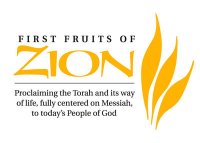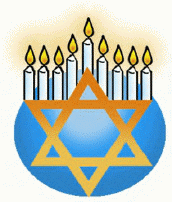|
Eight Days of Light December 1 - December 8, 2010 |
|
The story of Hanukkah teaches us about a group of men who were dedicated to God, intent on observing His commandments, living His Word, and serving Him in His holy Temple. Today we can learn much from this ancient family who resisted the ways of the Greek influence on their society. DAY ONE
December 1, 2010 Theme: Read: Ask Questions: Q: What problems did the Jewish people face? From whom? Q: Who were some of the Jewish heroes? Q:Why were they heroes? Q: Why do we light lights on Hanukkah? Discuss: Read: Pray: Sing: DAY TWO
December 2, 2010 Theme: Read: Discuss: Ask Questions: Q: What can Hanukkah teach us about God? About His grace? Pray: Sing: Day Three
December 3, 2010 Theme: Discuss: The title for this holiday is derived from Numbers 7:4 which recounts the. dedication of the tabernacle in the time of Moses. Ask Questions: Q: Can things, as well as people, be dedicated to God? Explain. Q: Go over Psalm 95:7 and Romans 12:1-2. Pray: Ask Him for hearts and minds like the Maccabees. Pray that you can be dedicated to preserving and living the ways and Word of God in today's ungodly society. Sing: DAY FOUR
December 4, 2010 Theme: Discuss: There is good historical evidence that the Hanukkah legend concerning the miracle of the burning oil never happened! The story says that when the Jewish people wanted to light the great menorah in the newly dedicated Temple during the Maccabean revolt, there was only enough oil to last one day. But God did a miracle! He caused the oil to last eight days, long enough to purify more oil. The problem with the above story is that none of the most ancient sources for the history of Hanukkah (I, II Maccabees and Josephus) mention the above miracle. That does not mean that it never happened. It just means that the earliest and best sources for the history of Hanukkah never mentition it. The miracle is first mentioned in the Talmud, compiled about five or six hundred years after the first Hanukkah. Having said that this miracle of the light probably never happened, does not mean that there was no miracle at Hanukkah. Indeed, there was a great miracle! It was both a spiritual and a military miracle. First, the greatest miracle was that in that increasingly assimilating and hellenistic Jewish society, there rose up a family of faithful Torah-observant, God-fearing Jews who made a courageous stand against those who were ignoring the Covenant of God. But not only did Mattathias encouraged his own family to live for the Lord, they also, in turn, were able to inspire others in their nation to do so. In the end, God honored that courage and that dedication to Him. The second miracle came on the battlefield. The Maccabees and their followers were vastly outnumbered, out-equipped, and out-trained by their Antiochian enemies. Yet, through courage, smart tactics and faith in their God, the Lord granted them the miraculous military victory they needed. What about the eight days? Hanukkah was celebrated for eight days, not necessarily because of a supposed miracle of oil, but because as the Maccabees hid in the hills and bravely fought the enemies through their guerrilla warfare, they were not able to celebrate Sukkot. Therefore, when they celebrated their victory in Jerusalem, they included in their celebrations the eight-day celebration of Sukkot. Back to our initial question, therefore. What was the real miracle at Hanukkah? The answer is that God granted both a spiritual and a military victory to those who were dedicated to Him. As we celebrate Hanukkah, what other miracles can we remember? What other great works has the Lord do for which we can sing praises to His Name? Discuss: Ask Questions: Q: Relate the times in your life when this has happened for you. Q: What purposes was God accomplishing when He did those things for the Maccabees? For you? Pray: Sing: DAY FIVE
December 5, 2010 Theme: Discuss: Point out that the Shamash pictures the Messiah. This special candle is used to give the other candles their light. In the end, it is given a separate place, a place of honor. So it is with us who are servants of Messiah: we are to give ourselves to Him for His use, and when He returns He will give us honor! Read:
Ask Questions: Q:What is it called? Q:Why do you think it is placed apart from all the rest of the candles? The Shamash is a great illustration for what the servant of the Lord is. Q:What do servants do? Q:Why are servants separate from others? Pray: Sing: DAY SIX
December 6, 2010 Theme: Discuss: As Messianic believers who understand the importance of commemorating the fact that God is a God who goes before His people in battle, we too can put our menorahs in the windows of our homes. We are His "called-out ones," called to stand out as lights in a dark world, the living stones of His Temple dedicated to His service. We can stand courageous and strong against the ever-present powers of assimilation that endlessly seek to make us put a "bushel over our light." We are to stand up to these "armies" and say, "We are the people of the living God!" We are to know as Yehoshna knew, "no one will be able to stand up against you all the days of your life" (Joshua 1:5). No matter what the army facing us looks like, we will not back down from who we are called to be-the "called-out ones" of the living God, to Him be the glory and power for ever and ever. Amen! Ask Questions: Q:How can we let people know what He has done for us? Q:Discuss this whole theme in light of Matthew 5:14-16 and Acts 1:8. Pray: Sing: The word Maccabee is an acrostic created by joining the first letters of the words in their battle cry, which they displayed on their banner Mi Camocha Ba'elim, Adonail "Who is like Thee, among the gods,oh Lord?" DAY SEVEN
December 7, 2010 Theme: Discuss: Read: Ask Questions: Q:What does our spiritual service of dedication/worship to God consist of? Q:What is the real source of our joy? John 17:13 (Read the whole of John 17.) Pray: Sing:"Then Shall the Virgin Rejoice" and "The Trees of the Field." Try some fun family dancing Dreidel: Is a game played by Jewish people all over the world which dates back to the time of the Maccabees. Traditionally the four-sided dreidel has the Hebrew letters: Nun, Gimel, Heh, and Shin. The game serves as a reminder of the Hanukkah miracle, and the letters represent the phrase Nes Gadol Haya Sham or "A great miracle happened there. In Israel, on all the dreidels the Shin is replaced with a Pey, which changes the phrase to Nes Gadol Haya Po or "A great miracle happened here." DAY EIGHT
December 8, 2010 Theme: Discuss: Read: Ask Questions: Q:What are some things light does for us? Q:What happens to darkness in the presence of light? Pray: Sing: This in another Devotional by First Fruits of Zion: Light in the Darkness
 From First Fruits of Zion Magazine Reprinted with permission. Copyright © 1999 First Fruits of Zion Ministries |
